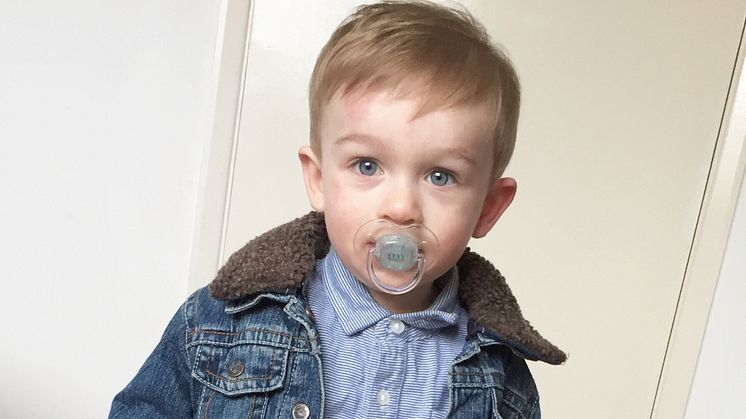
Press release -
Surrey family urges parents and families to spot the signs of stroke in children
A family are urging parents and young people in Surrey to learn about the signs of childhood stroke as a new guideline for parents launches today.
Grayson was born with meningitis on 17 December 2015 to his doting mother and father who brought him home and, two weeks later, had to take him back into hospital with a suspected second bout of meningitis. It was then that he had a stroke.

Grayson’s mother Bethany said: “At six weeks, on 31 January 2016, he started crying incessantly. I will never forget it. It was the most horrific cry I had ever heard. We waited hours and hours for an MRI scan which eventually revealed that Grayson had had a stroke because of a bleed in the brain. We were very naïve and didn’t know such a young child could have a stroke too. The doctors didn’t tell us anything for a very long time. That uncertainty and not knowing what was happening to my little boy was unbearable.”

According to the medical team, there was a very slim chance that Grayson would ever walk. Grayson is now 14 months old and walking. He has behavioural problems and can be hard to feed and comfort. For seven months, Grayson could not open his hands and kept choking on food as well as persistent crying day and night.
“It was the hardest to get support for Grayson after leaving hospital. We have been on the waiting list for support with portage, physiotherapy and OT for much of last year. If it wasn’t for the support of our family, I don’t think I could have held it together. If I had got the support at the right time, Grayson could have gone much further in his development and I will not have spent the last year fighting. It could have saved us all a lot of stress.
“We would like to share Grayson’s story so no other parent has to be faced with the devastation we had to when we first found out about his stroke. People don’t realise that children can have a stroke too and I am delighted to be supporting the Stroke Association so more and more parents are aware that stroke can strike in an instant and the effects can last for a very long time.”

The Guideline, produced by the Royal College of Paediatrics and Child Health (RCPCH) and the Stroke Association, covers diagnosis and rehabilitation and includes signs for spotting strokes in children:
Most children experiencing a stroke will have symptoms recognised by the FAST test: Facial weakness, Arm weakness, Speech problems, Time to call 999
Some children and young people may complain of a headache and others may have seizures (fits) at the time of the stroke. New and sudden onset of vertigo, dizziness, neck pain or neck stiffness are also sometimes signs that a child or young person is having or has had a stroke.
Nausea/vomiting, fever or loss of consciousness can also be signs of a stroke in children, so do not discount these.
Dr Vijeya Ganesan, a paediatric neurologist and spokesperson for the Royal College of Paediatrics and Child Health, said: “Although much less common than in adults, stroke is a devastating childhood illness, leaving permanent effects on most affected children. Early recognition is important to direct children towards rapid diagnosis and treatment. Many children with symptoms or signs that suggest stroke may have other serious neurological disorders and could also benefit from the changes in approach recommended by the guideline. The guidelines also provide comprehensive information on how to best manage the long term needs of children, particularly rehabilitation.”
Juliet Bouverie, Chief Executive of the Stroke Association, said: “Childhood stroke is often extremely frightening and stressful for children and their families. Far too few people realise that a child can have a stroke, which means diagnosis and treatment can take longer than for older patients. Whatever age you are, when stroke strikes, quick diagnosis is vital.”
To find out more and download the guidelines visit www.rcpch.ac.uk/stroke-guideline
Topics










